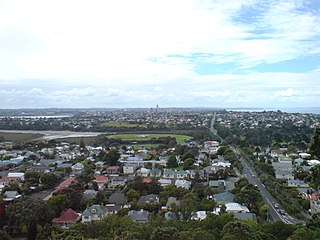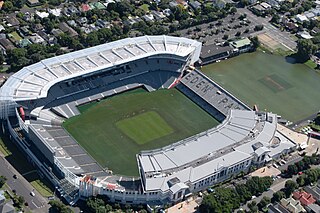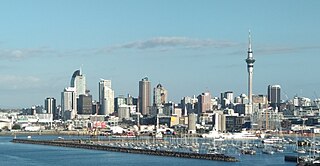
The North Shore is part of the large urban area of Auckland, New Zealand, located to the north of the Waitematā Harbour. To the east, has the Hauraki Gulf, to the west, is West Auckland, to the south, has the Waitematā Harbour and Central Auckland, to the north has the Hibiscus Coast. From 1989 until 2010, North Shore City was an independent city within the Auckland Region, until it was incorporated into the Auckland Council.

Eden Park is a sports venue in Auckland, New Zealand. It is located three kilometres southwest of the Auckland CBD, on the boundary between the suburbs of Mount Eden and Kingsland. The main stadium has a nominal capacity of 50,000, and is sometimes referred to as New Zealand's national stadium. The stadium is used primarily for rugby union in winter and cricket in summer, and has also hosted rugby league and association football matches, as well as concerts and cultural events. It is owned and operated by the Eden Park Trust Board, whose headquarters are located in the stadium.

The 2011 Rugby World Cup, was the seventh Rugby World Cup, a quadrennial international rugby union competition inaugurated in 1987. The International Rugby Board (IRB) selected New Zealand as the host country in preference to Japan and South Africa at a meeting in Dublin on 17 November 2005. The tournament was won by New Zealand, who defeated France 8–7 in the final. The defending champions, South Africa, were eliminated by Australia 11–9 in the quarter-finals. The result marked the third time that the tournament was won by the country that hosted the event.

Kingsland railway station is a station on the Western Line of the Auckland railway network in New Zealand. The station sits parallel to the Kingsland township, and is located 400m from Eden Park, the major rugby and cricket stadium in Auckland, and the home ground of New Zealand's national rugby team, the All Blacks.

North Harbour Stadium is a stadium situated in Albany, in North Shore City, New Zealand. It was opened in 1997, after nearly a decade of discussion, planning and construction. Rugby union, association football, rugby league, and baseball are all played on the main ground. The neighbouring oval plays host to the senior cricket matches. The stadium also hosts large open-air concerts.

The Tasman Rugby Union is the governing body for rugby union in Tasman Bay / Te Tai-o-Aorere, a bay at the north end of the South Island in New Zealand. Headquartered in Nelson, TRU is New Zealand's newest provincial union, founded in 2006 with the amalgamation of the existing Marlborough and Nelson Bays sub unions.
Carlaw Park was a multi-purpose stadium in Parnell, a central suburb of Auckland, New Zealand. It neighboured the Auckland Domain's Northern end. It was primarily used for rugby league and had a peak spectator capacity of around 28,000 in the 1930s, though this fell to around 17,000 by the time the ground was closed in 2002. It is now the site of several offices and the University of Auckland's largest student accommodation Carlaw Park Student Village.

The Auckland Regional Council (ARC) was the regional council of the Auckland Region. Its predecessor the Auckland Regional Authority (ARA) was formed in 1963 and became the ARC in 1989. The ARC was subsumed into the Auckland Council on 1 November 2010.
Transport in Auckland, New Zealand's largest city, is defined by factors that include the shape of the Auckland isthmus, the suburban character of much of the urban area, a history of focusing investment on roading projects rather than public transport, and high car-ownership rates.

The Auckland isthmus, also known as the Tāmaki isthmus, is a narrow stretch of land on the North Island of New Zealand in the Auckland Region, and the location of the central suburbs of the city of Auckland, including the CBD. The isthmus is located between two rias : the Waitematā Harbour to the north, which opens to the Hauraki Gulf / Tīkapa Moana and Pacific Ocean, and the Manukau Harbour to the south, which opens to the Tasman Sea. The isthmus is the most southern section of the Northland Peninsula.

Ports of Auckland Limited (POAL), the successor to the Auckland Harbour Board, is the Auckland Council-owned company administering Auckland's commercial freight and cruise ship harbour facilities. As the company operates all of the associated facilities in the Greater Auckland area, this article is about both the current company and the ports of Auckland themselves.

The Wynyard Quarter is a reclaimed piece of land on the Waitematā Harbour at the western edge of the Auckland waterfront, New Zealand.

The Auckland waterfront is a city-side stretch of the southern Waitematā Harbour coastline in Auckland, New Zealand. Previously mostly dominated by Ports of Auckland uses, from the 2000s on it is becoming increasingly open to recreational public use, with a number of former wharves being converted to office, entertainment, and later also some residential uses.

Public transport in Auckland, the largest metropolitan area of New Zealand, consists of three modes: bus, train and ferry. Services are coordinated by Auckland Transport under the AT Metro brand. Waitematā railway station is the main transport hub.

Westhaven Marina in Auckland, New Zealand, is the largest yacht marina in the Southern Hemisphere. The marina has nearly two thousand berths and swing moorings, and tends to be continually booked. Auckland, known as 'City of Sails', is generally known for its maritime passions.
The Marsden Point Branch is a 19 km (12 mi) branch line railway, which is to be built in the Northland Region of New Zealand's North Island. It will diverge from the North Auckland Line at Oakleigh, south of Whangārei, and serve Northport at Marsden Point. The proposal has existed since the 1970s and land for the rail corridor is being actively purchased.

City Vision is a centre-left coalition of two political parties, the New Zealand Labour Party and the Green Party of Aotearoa New Zealand, and community independents who contest Auckland Council elections every three years. They have usually caucused in affiliation with Labour Party councillors and progressive independents.

Auckland is the most populous city of New Zealand and the fifth largest city in Oceania. It has an urban population of about 1,478,800. It is located in the greater Auckland Region, the area governed by Auckland Council, which includes outlying rural areas and the islands of the Hauraki Gulf, and which has a total population of 1,739,300 as of June 2023. While Europeans continue to make up the plurality of Auckland's population, the city became multicultural and cosmopolitan in the late-20th century, with Asians accounting for 31% of the city's population in 2018. Auckland has the fourth largest foreign-born population in the world, with 39% of its residents born overseas. With its large population of Pasifika New Zealanders, the city is also home to the biggest ethnic Polynesian population in the world. The Māori-language name for Auckland is Tāmaki Makaurau, meaning "Tāmaki desired by many", in reference to the desirability of its natural resources and geography.
















